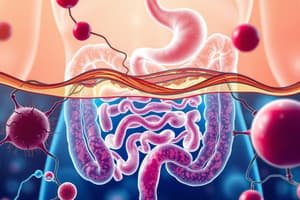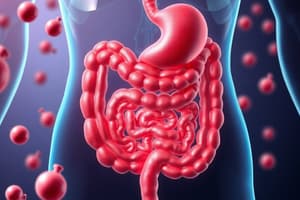Podcast
Questions and Answers
What is the role of the mouth in the digestive system?
What is the role of the mouth in the digestive system?
- Absorbing nutrients
- Initiating mechanical and chemical breakdown (correct)
- Storing waste products
- Producing hydrochloric acid
Which enzyme found in saliva is responsible for breaking down carbohydrates?
Which enzyme found in saliva is responsible for breaking down carbohydrates?
- Lipase
- Sucrase
- Amylase (correct)
- Protease
What is the function of hydrochloric acid in the stomach?
What is the function of hydrochloric acid in the stomach?
- Producing enzymes
- Breaking down carbohydrates
- Absorbing nutrients
- Killing bacteria (correct)
Which organ is primarily responsible for most nutrient absorption in the digestive system?
Which organ is primarily responsible for most nutrient absorption in the digestive system?
What is the main function of the pancreas in the digestive process?
What is the main function of the pancreas in the digestive process?
Which organ in the digestive system provides mechanical digestion through churning and grinding?
Which organ in the digestive system provides mechanical digestion through churning and grinding?
What is the main function of villi and microvilli in the small intestine?
What is the main function of villi and microvilli in the small intestine?
Which organs secrete enzymes that break down fats, proteins, and carbohydrates during digestion?
Which organs secrete enzymes that break down fats, proteins, and carbohydrates during digestion?
What are the three main classes of enzymes involved in the digestive process mentioned in the text?
What are the three main classes of enzymes involved in the digestive process mentioned in the text?
How do molecules move during passive diffusion in nutrient absorption?
How do molecules move during passive diffusion in nutrient absorption?
Which process involves the active movement of molecules against their concentration gradient?
Which process involves the active movement of molecules against their concentration gradient?
In the overall digestive process described, where does extensive nutrient absorption and chemical transformation primarily occur?
In the overall digestive process described, where does extensive nutrient absorption and chemical transformation primarily occur?
Flashcards are hidden until you start studying
Study Notes
Digestion: Understanding the Process of Nutrient Absorption
The digestive system is responsible for breaking down food into smaller components so they can be absorbed by the body. This intricate process involves several organs working together to transform food from its solid state into nutrients that fuel our bodies. Let's explore the main aspects of this essential physiological function: the digestive system, enzymes, nutrient absorption, and the overall digestive process.
The Digestive System
The human digestive system consists of a series of interconnected organs designed to break down food, extract essential nutrients, and eliminate waste products. These organs include the mouth, esophagus, stomach, small intestine, large intestine, pancreas, liver, and gallbladder.
Mouth and Esophagus
Your journey begins with the mouth, which initiates the process of mechanical and chemical breakdown through chewing and saliva production. Saliva contains enzymes like amylase, which breaks down carbohydrates. Meanwhile, the esophagus transports food to the stomach using peristaltic movements.
Stomach
Once food enters the stomach, it becomes mixed with gastric juices containing hydrochloric acid and proteolytic enzymes. These components aid in breaking down proteins, killing bacteria, and preparing food for absorption. The stomach also provides mechanical digestion via churning and grinding.
Small Intestine
The small intestine is where most nutrient absorption occurs. This long tube, coiled up in your abdominal cavity, features finger-like projections called villi and microvilli, which increase the surface area available for absorption. Secretions from the pancreas and liver mix with food, breaking down fat, protein, and carbohydrates further. Absorption happens across cell membranes in this region, allowing the body to utilize crucial nutrients like water, vitamins, minerals, proteins, glucose, sodium, potassium, calcium, iron, and phosphorus.
Large Intestine
The remaining waste products pass through the large intestine, where most of the water and electrolytes are absorbed and bacteria ferment any undigested carbohydrates. Eventually, feces are formed and stored in the rectum until elimination occurs.
Enzymes: The Chemical Breakdown
Enzymes play a significant role in the digestive process, facilitating chemical breakdown in both mechanical and physiological processes. Three main classes of enzymes are involved: lipases, proteases, and carbohydrases. They work together to break down fats, proteins, and carbohydrates respectively into their smaller components, ultimately allowing them to be absorbed and utilized by the body.
Nutrient Absorption: How We Utilize Digested Food
Nutrient absorption primarily occurs in the small intestine via two methods: passive diffusion and active transport. During passive diffusion, molecules move from an area of higher concentration (outside the cell) towards an area of lower concentration (inside the cell), driven by their concentration gradient. Active transport involves specialized proteins called transporters, which actively move molecules against their concentration gradient in exchange for energy, providing a means for the absorption of specific substances.
The Overall Digestive Process: From Mouth to Waste Elimination
Digestion can be likened to a dance between these organs and enzymes, all working together to convert solid food into simple nutrients that can be absorbed and used by our bodies. After swallowing, food travels through the esophagus into the stomach, where gastric juices begin the chemical breakdown. Next, the partially broken-down food enters the small intestine, allowing for extensive nutrient absorption and chemical transformation. Finally, waste products pass through the large intestine before being eliminated.
Understanding the intricate details of the digestive system helps us appreciate how our bodies efficiently extract nutrients from food and get rid of waste materials. By maintaining a balanced diet that includes a variety of foods, we support optimal functioning of this vital system.
Studying That Suits You
Use AI to generate personalized quizzes and flashcards to suit your learning preferences.




